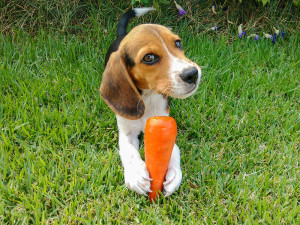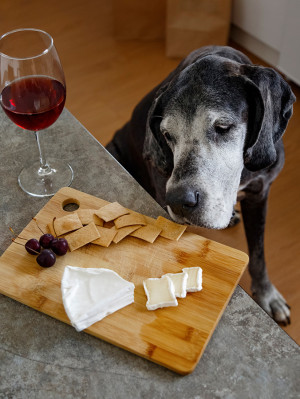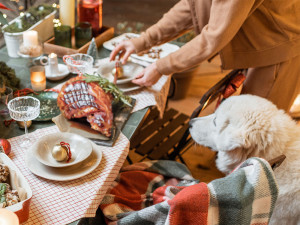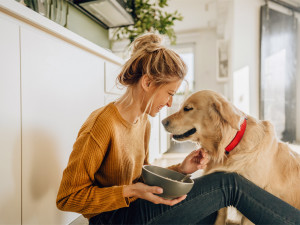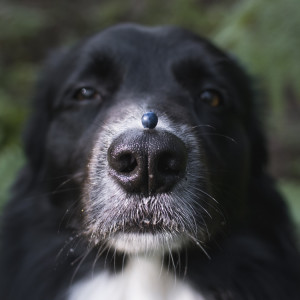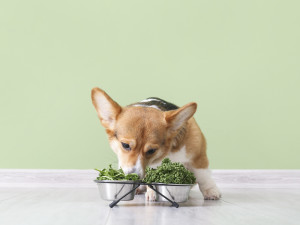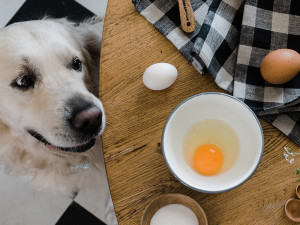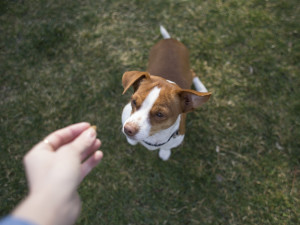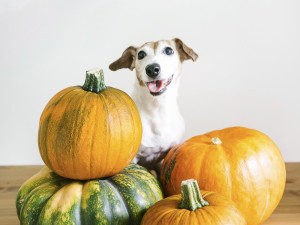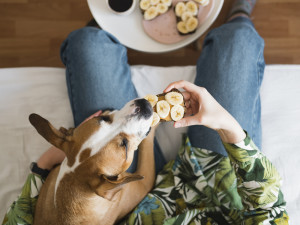Can Dogs Eat Corn?
A few kernels are fine—but keep it off the cob.
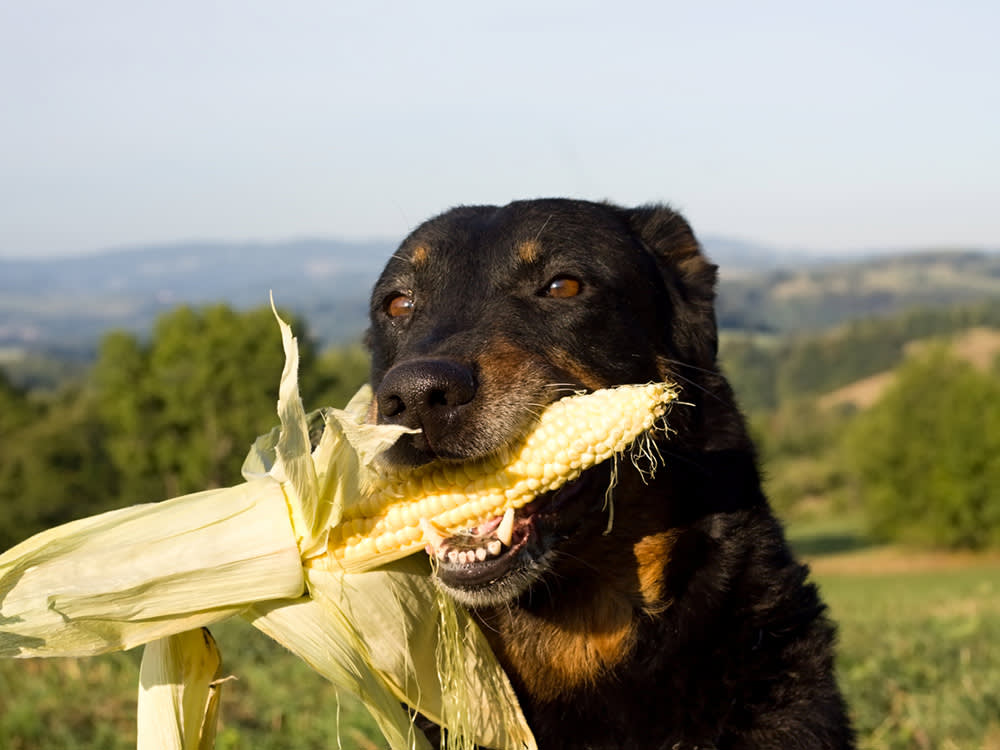
Share Article
Corn may be common, but it is anything but basic; there are so many delicious foods that come from corn: tortillas, corn bread, corn muffins, and let’s not forget the most satisfying of all: warm corn on the cob loaded with all of your favorite toppings. It is a year-round staple that we find in so many cuisines worldwide.
Of course, as a doting dog parent, you may be wondering whether you can share any of these corn-based delicacies with your number-one pup. The answer is yes, so long as you stick to some important guidelines.

littleKin™ is Kinship’s home just for puppy and kitten parents. Bop over to check out expert advice, new pet tools, and special deals—all curated for your newest family member.
opens in a new tabNutrition facts about corn for dogs
Corn is an ancient crop that has helped civilizations thrive for thousands of years. It is believed to have originated from a wild grass in Mexico called teosinte that was cultivated over time into the crop we know today as corn. Corn is a nutritious, energy-dense food, which is why it was so important to early civilizations and why we continue to use it in so many products today.
Corn also be nutritious and provide valuable health benefits — as long as it is used in moderation. Here are some of the benefits your dog can enjoy if they eat corn:
Fiber: Corn is a great source of fiber when eaten in its whole grain format. The outer layers of the corn kernel contain a bran layer that is rich in insoluble fiber. This is the kind of fiber that helps to create bulk in the stool and prevent constipationopens in a new tab. It also helps dogs to feel full and satisfied even if their meal is lower in calories, which is helpful for dogs who need a weight managementopens in a new tab plan.
B Vitamins: Whole grains, such as corn, contain crucial B vitamins including Folic acid or B9, B6 and B12. These vitamins have many important roles in the body including helping to break down other nutrients and to support normal immune function and brain health.
Minerals: Minerals like zinc, magnesium, copper, and iron are also found in corn. These minerals are required for normal cell function and do many different things throughout the body. This includes providing support for cell growth, building proteins, muscle and nerve activity, and a healthy immune system.
Starch: Corn is a high-starch food which means that it contains lots of carbohydrates that are broken down into sugars. This makes it a good source of energy; however, too many starches and sugars can also lead to spikes in blood sugar and put dogs at risk for weight gain. For these reasons, corn should be shared with dogs in moderation. Ideally, offer your pup corn in its whole kernel form since the fiber in the kernel slows down digestion and prevents spikes in blood sugar. Processed products made from corn don’t have this same advantage.
Is corn good for dogs?
Corn can be good for dogs in small amounts, as long as your pup eats a complete and balanced diet to meet all of their nutritional needs. In fact, many commercial dog food companies utilize corn in their recipes since it provides many of the nutrients that dogs need. This includes insoluble fiber, carbohydrates, and vitamins and minerals. It is best to share whole grain corn products with your dog in order to maximize these benefits, especially fiber, found in the outer layers of the corn kernel.
As always, any treats and snacks should be kept to less than 10 percent of your dog’s diet to ensure they are not overeating and to be sure that they are getting all of the nutrients they need from a balanced dog food. If they fill up on treats and table scraps, they might be too full to eat their regular dog food, setting them up for nutritional deficiencies in the long run.
Can dogs eat corn on the cob?
Dogs should never eat corn on the cob or have access to corn cobs of any kind. This is because they are soft enough for dogs to chew up into smaller pieces, and these pieces can be a choking hazard and put them at risk for intestinal obstructions. I’m pretty sure every veterinarian who performs surgery has removed at least one corn cob obstruction from a dog’s intestines. It’s that common.
Dogs are often attracted to them even if all the corn kernels are gone because they smell and taste like whatever they were seasoned with. Dogs will go so far as to eat them out of the trashopens in a new tab or dig them out of discarded soup fixings, so be sure to keep them far out of reach of your dog.
Is corn completely safe for dogs?
Corn is safest for your dog when offered in small amounts and with a few caveats. Because whole corn kernels are a high fiber food, too much of it can lead to digestive upset opens in a new tabincluding gas and diarrhea. There are a few other points to keep in mind to keep your pup safe too:
Avoid choking hazards: Corn cobs and husks are the right size and shape to be both choking hazardsopens in a new tab and put dogs at risk for intestinal blockages. They should never be given to dogs. In addition, be sure to keep any other sharp, pointy corn accessories away from dogs too, like the adorable corn on the cob holders that keep your fingers safe from hot corn. Anything that has the smell and flavors from the corn might appeal to your dog. Some street fairs may also serve corn on a stick. Many times, dogs will eat these too if they taste like the delicious seasonings from the corn, so be sure to keep them all far out of reach.
High starch and sugar content: Corn has a high carbohydrate content in the form of sugars and starches, which can be unhealthy for dogs in large amounts. Too much can lead to spikes in blood sugar, which is especially unhealthy for dogs with health problems, like diabetesopens in a new tab.
In general, too many starches and carbohydrates can also lead to weight gain and additional health problems. Highly processed products made from corn or corn syrup should be avoided since these often lack many of the health benefits of corn but still contain the high sugar and starch content.Other ingredients: As always, keep in mind all of the ingredients that are in the foods you are sharing with your pup. Many times, other ingredients may not be safe to share. For example, oils and fats like butter are often used to make corn on the cob extra delicious but these kinds of high fat foods can cause digestive upset for many dogs, and for some, it can lead to more serious problems like pancreatitisopens in a new tab. Also beware of other spices and ingredients that can be toxicopens in a new tab and/or unhealthy to dogs such as garlic, onions, spicy chilis, high salt foods, and many dairy products.
Aflatoxin poisoning: Aflatoxin comes from a mold called Aspergillus flavus that grows on corn and other grains. It can cause serious illness in both pets and people who ingest enough of it, including severe liver damage.
Never share any moldy food with your dog. There have also been some recalls of dog foods due to high levels of aflatoxin in the past. Responsible pet food companies monitor their products closely for unsafe levels of contamination, so be sure to keep an eye out for any recalls.
The bottom line: Can dogs eat human food?
Dogs can and do eat many kinds of human foodopens in a new tab. The most important point to keep in mind is that dogs should only eat these foods in small amounts. Too much table food can lead to weight gain and/or put your dog at risk for nutritional deficiencies if they don’t eat enough of their balanced dog food diet.
In general, it’s best to limit treatsopens in a new tab and snacks to less than 10 percent of your dog’s total diet to keep this in check. And while there are many delicious foods you can share with your pup, always double checkopens in a new tab that what you are sharing is safe and not toxic to dogs, as there are also many foods that your dog should not eat.
Finally, try to use these shared snacks as an opportunity to reinforce basic training cuesopens in a new tab and behaviors with your dog. Discourage your dog from begging at the table or following you around for a taste, and instead, set a cue for your dog to sit and wait by their crate, matopens in a new tab, or food bowl and reward them with a taste for doing so. This can help motivate your pup to follow your cues, and the more you practice, you will both start to fall into these good habits automatically.
Other foods that are safe for dogs
Bananas can be a sweet treatopens in a new tab to share with your pup.
These seeds are safe and healthy, too.
Kale, carrots, and pumpkin are all great choicesopens in a new tab.
Other foods that are dangerous
Sugar-free foods containing xylitol opens in a new tabare toxic to dogs.
Grapes and raisins opens in a new tabare also not for sharing.
Skip the avocado opens in a new tabfor your pup, too.
FAQs (People also ask)
How much corn can a dog eat?
Dogs can have small tastes of corn and certain corn-based foods but this should be no more than 10 percent of your dog’s daily diet to save room for the nutrients they really need in their dog food.
Is it OK to give dogs corn?
Yes, corn is safe for dogs in small amounts, as long as it does not contain other unsafe ingredients and you avoid giving them the corn cob.
Why do dogs like corn?
Corn is sweet and crunchy and many dogs enjoy both the flavor and the texture.
Can dogs eat corn syrup?
Foods containing corn syrup are not toxic to dogs but should be avoided since they are very high in sugar and do not contain the other health benefits of whole corn kernels.
References:

Dr. Amy Fox, DVM
Amy Fox, DVM is a small animal veterinarian in New York City. A lifelong animal lover, Dr. Fox studied biology in college and then worked as a veterinary nurse before pursuing veterinary school at Cornell University. She has worked in many different settings including shelter medicine, emergency medicine, general practice, and animal cruelty and forensics. She is especially interested in nutrition, preventative medicine and care for senior pets. Dr. Fox also enjoys writing about veterinary medicine and teaching. In her free time she loves to cook, garden, and go for long runs.
Related articles
![Beagle puppy dog holding a peeled carrot in its front paws sitting in the grass]() opens in a new tab
opens in a new tabCan Dogs Eat Carrots?
Yep—this crunchy, sweet vegetable is a great addition to your dog’s diet.
- opens in a new tab
Can Dogs Eat Kale?
Yep — this superfood is good for your dog in small amounts.
![Golden retriever looks at some eggs on the counter]() opens in a new tab
opens in a new tabCan Dogs Eat Eggs and Eggshells?
Yes, eggs are a nutritious treat for dogs.
- opens in a new tab
Can Dogs Eat Almonds (and Other Nuts)?
This healthy snack for humans isn't so healthy for your pup. Here's why it's best to avoid them.
- opens in a new tab
Can Dogs Eat Pumpkin?
The superfood is delicious, and it’s a natural remedy for some common pup ailments.
- opens in a new tab
Can My Dog Eat Bananas?
Yep — bananas are a healthy and delicious treat for your pup.
